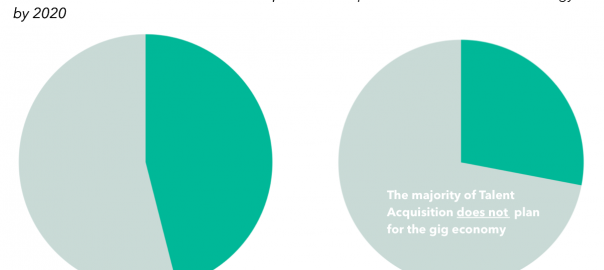It’s 2017. People go across the city with Uber, and across the country with AirBnb. They clean their houses with Handy, and walk their dogs with Rover.
This is the gig economy; the term being thrown around by everyone from business writers to Hillary Clinton. It’s the trend of employment from long-term, stable positions to short-term, ephemeral services by freelancers and contractors.
But the majority of talent acquisition (TA) and HR teams have no plan for flexible talent management. Statistics from a PricewaterhouseCoopers (PwC) study called The Future of Work showed the stark contrast between expectation and preparation:

Professionals who can find, recruit and mobilize freelance talent will be more and more valuable to companies, particularly small business and fast-moving industries.
Here are four steps to optimize your TA and HR management for this new trend:
1. Make contractors a part of your TA strategy
Today, the gig economy is a small part of talent acquisition; around $ 8Bn (just 2% of the market), according to recent research by PwC.
But by 2020, this is expected to grow to $ 63Bn – an 8x increase. This is largely due to the increase in working millennials who tend to value freedom and control of their careers.

Strategically recruiting and utilizing talented temps and contractors can be used to fill crucial skill gaps.
If you urgently need a financial analyst, you can strategically recruit a talented contractor to fill that skill gap, without engaging in a lengthy recruitment process for a full time hire you might not need after the project’s completion.
Companies who understand this dynamic have drawn from talented skill pools to accelerate their performance. Advorto recently released a report detailing how FinTech startups are bringing in talent from the banking and finance sectors.
2. Treat temps like full-time
A study by CIPD revealed that the main concern about hiring temporary talent was low quality of work. But less than half of these same respondents offered training to temporary workers, and barely any offered performance reviews.
Just because staff is non-permanent doesn’t mean you shouldn’t invest in them. Give contractors the level of attention and mentorship required for them to be successful.

This also means breaking down information silos – if these employees can’t access valuable information, they will be less effective. Allowing free flow of information can ensure everyone has maximum potential.
3. Create an alumni network
When a temporary employee leaves, don’t hold it against them – give them your support. Instead of burning bridges, build an ‘alumni’ network in your field.

These people will develop skills, make connections, and may end up bring value back to your organization in unexpected ways, through an employee referral, introduction to business partner, or another project in the future.
4. Use HR tech and automation to your advantage
There are several tools HR and TA professionals can use to harness the flexibility of the gig economy, without getting overwhelmed:
- Using automated systems such as an applicant tracking system (ATS) can allow for more efficient interviewing and acquisition of temporary talent.
- Larger companies may want to look into a Freelance Management System (FMS), such as UpWork, WorkMarket or RallyTeam, to find and recruit freelancers through a project-oriented, rather than position-oriented, system.
- And, of course, utilizing a referral program is invaluable for finding vetted talent, including in the gig economy.
The gig economy is changing the way people work, and inevitably, the way we hire. But people are still people, and talent is still talent. Contractors can be invaluable to short-term projects and bursts of growth.
Any other suggestions on how the gig economy will impact HR? Leave your comments below.
Business & Finance Articles on Business 2 Community(65)




